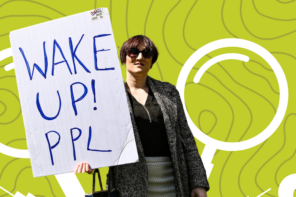Most of us are familiar with the genre of political reporting in which a journalist from the Times parachutes into Ohio or Arizona (or wherever) to talk to Donald Trump’s supporters while they’re eating. Most don’t know, or have forgotten, this genre is a result of regime change. After the liberal order established under Roosevelt in the 1930s gave way to the conservative order established under Reagan in the 1980s, a regime in which we are living still, the press corps got into the habit of explaining, after a Republican wins the White House, why Republican voters think a Republican president is super-duper, even now when he’s a lying, thieving, philandering sadist.
Implied in explanations ad nauseam is a specific audience: people residing on the coasts, and in and around major cities throughout the country. Also implied, but more subliminal, is a conclusion: that people residing on the coasts, and in and around major cities, don’t understand people who don’t do the same. Another implication, far more cartoonish, is that everyone on the coasts, and in and around major cities, is a Democrat while everyone who does not live in those areas is a Republican. This is often called the urban-rural divide. It’s so symmetrical as to be almost entirely fictional.
To be sure, country folk really do not, and will not, try to understand city-dwellers above and beyond what they see on television. The reverse, however, is mostly false. A minority percentage of city residents understand country folk intimately, because they left country living for jobs, excitement, love—everything cities can offer. And they’ve done so in a historic wave. When FDR’s regime gave way to Reagan’s, cities really were terrible places. But “by the turn of the third millennium, cities had turned around, not just in the United States but also all over the world,” Alex Marshall wrote today in Governing magazine. “They had gotten safer, cleaner, richer and more populous. Characters in countless TV shows and movies led fulfilling lives in urban environments, with ‘urban’ now meaning cool, interesting and less car-oriented.”
Beneath the urge to find jobs and excitement lies something else, though—a desire to get the hell away from the country people. While a small minority of rural residents care about democracy, individual liberty, the common good and the rule of law, a large majority don’t. They are indeed hostile toward small-r republican values. Rural culture, while it goes by a variety of abstractions, is first and foremost top-down, and rigid and intolerant of novelty, innovation, and fair play (rules-based competition). Many young people leave because they can’t find work. However, many young people who possess creativity, sensitivity and intelligence must leave if they value their freedom and sanity. In a very real sense, they didn’t leave as much as they were driven out. Creativity, sensitivity and intelligence are rewarded in the city. They’re punished in the country. (I’m speaking in generalities, but simply ask anyone who fled their roots for details.)
The Times almost never hires the people I’m talking about. The Times, like all elite institutions, hires its own, which is to say other elites. A reporter who spent her life in college prep schools and the Ivy League before moving to Manhattan to work at the Times is vulnerable to media representations of rural life, because they’re media representations created by and for other elites. Fact is, when rural Arizonans talk about “law enforcement” over a plate of eggs and bacon, what they mean is punishing the weak. When they talk about their “liberty,” what they mean is their dominance. When they talk about their “traditional values,” what they mean is their control. A Times reporter can’t possibly know any of that. The problem is made worse when sources give voice to this or that conspiracy theory. She can’t know her sources aren’t delusional. She can’t know they aren’t crazy. She can’t know that conspiracy theories are central to their authoritarian view of the world. So she doesn’t report how dangerous their politics are.
She ends up reporting that some Americans believe, for instance, that a “secret cabal” of Democrats and other “radical leftists” in the “deep state” is, in addition to sexually molesting innocent children and perhaps eating them, too, trying to bring down Donald Trump. (This is the QAnon conspiracy you’ve read about lately.) What she should be reporting is that some Americans are willing to say anything to justify any action—violence, insurrection, even treason—to defeat their perceived enemies. Elite reporters, and some non-elite reporters who are following suit, keep talking about conspiracy theories as if they were a “collective delusion.” They are no such thing. The authoritarians who espouse them don’t care if QAnon is true. They don’t care that it’s false. Conspiracy theories are a convenience, a means of rationalizing what they already want to do, which is precisely what elite reporters can’t know and do not report.
Reporters dashing off to heartland diners to interview Republicans was an indicator that the old liberal order had given way to a new conservative order. My hope is that reporters will soon figure out they’re being played. Once they do, perhaps that will be an indication the conservative order we’re all still living in has finally given way.





